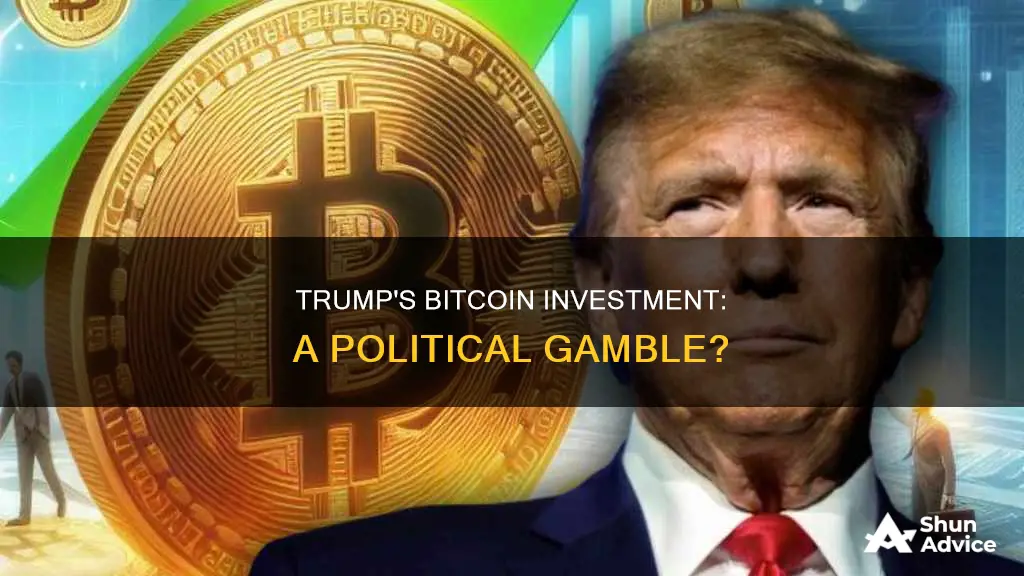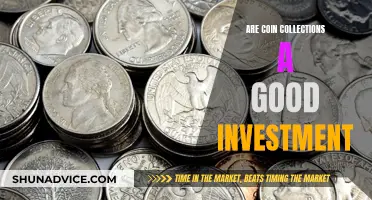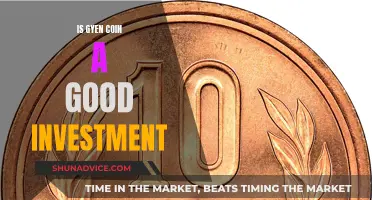
Former US President Donald Trump has made a dramatic U-turn on his stance towards Bitcoin and cryptocurrencies. Having previously dismissed Bitcoin as a scam and based on thin air, Trump now embraces it, promising to establish a national bitcoin stockpile if re-elected. This shift is an attempt to appeal to a new bloc of mega-donors and voters, as well as to criticise the Biden administration's hardline regulatory approach towards crypto. Trump's new-found support for Bitcoin has raised questions about the potential impact on the crypto industry and the broader implications for the US economy and geopolitical position.
| Characteristics | Values |
|---|---|
| Current stance on bitcoin | In 2024, Trump publicly supported bitcoin at the Bitcoin 2024 conference in Nashville, Tennessee. |
| Previous stance on bitcoin | In 2019, Trump denounced bitcoin as "highly volatile and based on thin air". |
| Plan for bitcoin if re-elected | Trump plans to establish a "national bitcoin stockpile" and "never sell" bitcoin. |
| Reasoning for plan | Trump believes that the US government selling bitcoin contributes to inflation. |
| Expert opinion on plan | Economists believe the plan has little merit and could be costly for most people. |
What You'll Learn

Trump's stance on bitcoin
Former US President Donald Trump has expressed a positive stance on Bitcoin and cryptocurrencies, a notable shift from his previous position during his presidency.
Support for Bitcoin
Trump has stated that he wants to make the US the "crypto capital of the world" and has pledged to ensure the federal government never sells its Bitcoin holdings. He has also proposed a strategic national crypto stockpile, suggesting that the government should "never sell your Bitcoin". This proposal was well-received by the Bitcoin community, marking a significant change from his previous dismissal of Bitcoin as a "scam" during his time in office.
Criticism of Biden Administration
Trump has criticised the Biden-Harris administration's regulatory approach to crypto, specifically targeting Gary Gensler, the Biden-appointed chairman of the Securities and Exchange Commission (SEC), whom he has promised to fire if he returns to the White House. He has positioned himself as a pro-crypto candidate, promising to dismantle what he calls the "anti-crypto crusade" of the current administration.
Political Strategy
Trump's shift in stance is seen by some as a strategic move to appeal to a new bloc of mega-donors and voters in the tech and crypto industries. His promises to support and promote crypto have attracted the support of crypto lobbyists and investors, who have donated millions to his campaign. This includes prominent figures such as the Winklevoss twins, venture capitalists Marc Andreessen and Ben Horowitz, and Silicon Valley entrepreneur Peter Thiel.
Economic Impact
Trump's plan to establish a national Bitcoin stockpile has been met with scepticism by economists, who question its economic merits. They argue that stockpiling Bitcoin would benefit only a small subset of the population and could create a situation where taxpayers are subsidising a risky and volatile asset class. Additionally, the opportunity cost of holding Bitcoin, as opposed to generating income through other assets, is a significant consideration.
In summary, Trump's stance on Bitcoin has evolved from scepticism to support, driven by political and strategic considerations. His promises to make the US a crypto leader and his criticism of the current administration's regulatory approach have won him favour among crypto enthusiasts. However, his plans, particularly regarding a national Bitcoin stockpile, have raised economic concerns about their potential impact and benefit to the broader population.
Should You Invest in Bitcoin?
You may want to see also

Economists' views on Trump's bitcoin plans
Donald Trump's plans for Bitcoin have been met with scepticism by economists, who argue that his proposal to establish a "national bitcoin stockpile" lacks merit and could be a disaster for Bitcoin. Trump's idea is to use Bitcoin to offset inflation, but economists argue that this is based on shaky assumptions about Bitcoin's future value and the government's ability to sell Bitcoin without impacting the market.
James Angel, an economist at Georgetown University, believes Trump's plan has no economic benefit beyond appealing to Bitcoin supporters. He argues that the government's purchase of Bitcoin will push prices up, but attempting to sell it would push prices back down. Angel also points out the contradiction between Trump's desire to increase the stockpile and his other goals of reducing taxes and driving down inflation and national debt.
George Selgin, director emeritus of the Cato Institute's Center for Monetary and Financial Alternatives, agrees that the US government's speculation on Bitcoin's price is not a good idea. He believes that the government should instead sell the Bitcoin it possesses and use the profits for other purposes, such as reducing federal debt or funding government programs.
Michael Green, chief strategist at Simplify, an asset management firm, highlights the potential cost of Trump's plan to most people, as the government would be subsidising a small subset of the population who own Bitcoin. He also warns that the government would become increasingly beholden to the Bitcoin mining industry, creating another special interest group that would need bailing out in times of crisis.
Despite these criticisms, Trump's plan has been celebrated by some in the Bitcoin community, including Republican Senator Cynthia Lummis, who proposed legislation to amass one million Bitcoin for the US government. Lummis and others see Bitcoin as a way to diversify the nation's finances and reduce debt.
Trump's shift in stance on Bitcoin, from dismissing it as a "scam" to embracing it as a presidential candidate, is seen as an opportunistic move to attract donor dollars from the crypto industry and appeal to a new bloc of mega-donors. His promises to make the US the "crypto capital of the world" and to fire SEC chair Gary Gensler, who has taken an aggressive stance on crypto regulation, have been well-received by the crypto community.
Dogecoin: Long-Term Investment or Just a Meme?
You may want to see also

Trump's bitcoin promises
In a surprising turn of events, former US President Donald Trump has shifted his stance on Bitcoin and cryptocurrencies, making a series of promises to the crypto community during his keynote speech at the Bitcoin 2024 conference in Nashville, Tennessee. This marks a significant change from his previous dismissal of Bitcoin as a "scam" during his time in the White House. Here are the key promises made by Trump:
National Bitcoin Stockpile:
Trump proposed establishing a "national bitcoin stockpile" if he is re-elected, vowing to keep all Bitcoin held by the US government and not sell any of it. He positioned this as a way to end the inflation created by the Biden administration. However, economists have criticized this idea, arguing that it has little economic merit and could create a situation where taxpayers subsidize a small subset of the population.
Crypto-Friendly Policies:
Trump promised to make the United States the "crypto capital of the planet" and the "bitcoin superpower of the world." He criticized the Biden-Harris administration's regulatory approach towards crypto and vowed to dismantle what he called their "anti-crypto crusade." He also pledged to fire Gary Gensler, the chairman of the Securities and Exchange Commission (SEC), who has taken an aggressive stance on crypto regulation.
Bitcoin as a Strategic Reserve Asset:
Trump expressed support for classifying Bitcoin as a strategic reserve asset, similar to oil and gold reserves. He highlighted the geopolitical significance of Bitcoin, arguing that any policy hampering it would only help China and Russia. This idea has gained traction among some policymakers, including Senator Cynthia Lummis, who proposed legislation for the US government to amass one million Bitcoin.
Support for the Crypto Industry:
Trump promised to create a "bitcoin and crypto presidential advisory council," stating that the rules would be written by people who love the crypto industry. This promise was well-received by the industry, which has faced a crackdown by the SEC under the Biden administration. Trump's shift towards crypto is seen as an attempt to appeal to a new bloc of mega-donors and voters in the tech and startup spaces.
Bitcoin Mining in the USA:
Trump emphasized his desire for Bitcoin to be "mined, minted, and made in the USA," stating that if Bitcoin is going to the moon, he wants America to lead the way. He also mentioned his plan to ensure that all future Bitcoin is made in America, positioning himself as a pro-Bitcoin candidate.
While Trump's promises have excited the crypto community, some have expressed skepticism about his motives, suggesting that he is opportunistically seizing on the current administration's regulatory pushback from the industry. Additionally, there are concerns about the feasibility and potential consequences of some of his proposals, particularly regarding the national bitcoin stockpile idea.
How to Invest in Dogecoin: A Beginner's Guide
You may want to see also

The crypto lobby
The Blockchain Association
The Blockchain Association is an industry trade group representing crypto firms. Since December 2020, the group has added 10 members, bringing its total to 34. The group's executive director, Kristin Smith, has expressed concern about federal regulators clamping down on the industry over what she believes are misplaced fears. The association aims to reorient policymakers away from the view that digital currencies are used primarily for illegal transactions.
Coin Center
Coin Center is a leading DC-based advocacy group that has received donations from Twitter CEO Jack Dorsey and the world's largest digital asset manager, Grayscale. The group is preparing for a lengthy lobbying battle or lawsuit over proposed regulations from the Financial Action Task Force and Treasury Department, which they believe would place unnecessary burdens on investors and blockchain networks.
Crypto Council for Innovation
The Crypto Council for Innovation is a trade group formed by Square, Fidelity Investments, Coinbase Global, and crypto-investor Paradigm. The council aims to influence the way that bitcoin and other cryptocurrencies are regulated. With the price of digital assets climbing, the Crypto Council for Innovation seeks to provide a voice for the young industry and highlight the benefits of digital currencies and related technologies. The council's board includes representatives from each of its four initial members.
Political Support for Crypto
Dogecoin Investing: A Guide for Indians
You may want to see also

Trump's bitcoin supporters
Donald Trump's shift in stance on Bitcoin has won him support from several individuals and groups. At the Bitcoin 2024 conference in Nashville, Trump pledged to make the US the "crypto capital of the world" and a "bitcoin superpower". This has helped him gain support from a new bloc of mega-donors, including venture capitalists and tech industry leaders.
Winklevoss Twins
The crypto billionaire twins, Tyler and Cameron Winklevoss, contributed 15.57 bitcoin (over $1 million at the time of their donation) to Trump's campaign. Tyler Winklevoss later celebrated Trump's plan to establish a national bitcoin stockpile and congratulated the organiser of the conference for having "orange-pilled" the former president.
Venture Capitalists
Venture capitalists Marc Andreessen and Ben Horowitz have offered support to pro-Trump PACs. They have told employees of Andreessen Horowitz (a16z) that they plan to make significant donations to political action committees supporting Trump's campaign.
Sequoia Capital
The partners of Sequoia Capital are also backing Trump's campaign.
David Sacks
Venture investor David Sacks helped Trump raise $12 million at a fundraiser he hosted in his San Francisco home.
Fairshake
Fairshake is a pro-crypto super PAC that has raised more than $200 million to elect pro-crypto candidates.
BTC Inc.
In June 2024, BTC Inc. CEO David Bailey pledged to raise $100 million and turn out more than 5,000,000 voters for the Trump re-election effort.
Robert F. Kennedy, Jr.
Independent presidential candidate Robert F. Kennedy, Jr. has also spoken in favor of boosting crypto. He presented a plan at the Bitcoin 2024 conference to acquire four million bitcoins for the US if he were president.
Senator Cynthia Lummis
Republican senator Cynthia Lummis of Wyoming proposed legislation that would see the US government amass one million bitcoin under Trump. She has suggested that the Federal Reserve diversify its foreign currency holdings by adding bitcoin.
Vivek Ramaswamy
Former presidential candidate Vivek Ramaswamy has been advising Trump on bitcoin and digital assets since January 2024. He proposed that the dollar be backed by a basket of commodities that could include bitcoin.
Silicon Valley Elite
There is a broader shift in the tech world towards Trump and supporting Republican candidates, driven by concerns over strict enforcement and regulatory hurdles.
Strategies for Crypto Investment Without Coin Purchase
You may want to see also
Frequently asked questions
Trump has not publicly disclosed any personal investments in Bitcoin. However, in July 2024, he expressed strong support for the cryptocurrency and has been actively courting the crypto community during his 2024 presidential campaign.
Trump has made several statements about Bitcoin and cryptocurrencies. In July 2024, he said, "I want the dollar to be the currency of the world, that's what I've always said." He also stated, "If crypto is going to define the future, I want to be mined, minted and made in the USA." Trump has proposed establishing a "national bitcoin stockpile" and positioning the US as the "crypto capital of the world."
No, Trump has shifted his stance on Bitcoin and cryptocurrencies. In 2019, he denounced cryptocurrency as "highly volatile and based on thin air." In 2021, he called Bitcoin a "scam" in a phone interview with Fox. However, in 2024, he embraced digital assets and Bitcoin, sparking discussions about its potential as a strategic reserve asset.
Trump's shift in stance on Bitcoin is likely influenced by his 2024 presidential campaign strategy. By appealing to the growing crypto community and mega-donors in the tech industry, he aims to gain their support and attract donor dollars. Additionally, Trump has criticized the Biden administration's hardline regulatory approach towards cryptocurrencies, positioning himself as a more crypto-friendly alternative.
Trump's support for Bitcoin has been well-received by the crypto community and industry executives. However, economists and critics have questioned the merits of his proposed "national bitcoin stockpile," arguing that it may not provide economic benefits and could create challenges for the government. Some also view Trump's embrace of Bitcoin as opportunistic and electioneering.







